Members
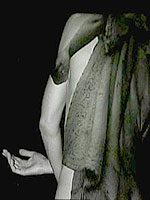 Dr Claudia Kappenberg
Dr Claudia Kappenberg
University of Brighton, UK
Claudia Kappenberg leads the Center for Screendance and was Principal Investigator of the original AHRC Screendance Network. She trained in Modern Dance, Butoh and Movement Analysis and danced professionally in Europe and New Zealand. She completed an MA Fine Art/Film and Video at Central Saint Martins College of Art and Design in 1998 and taught on the BA Fine Art until 2002. Since October 2003 she is Principal Lecturer and teaches on the BA Moving Image at the University of Brighton, UK, where she also completed her PhD.
Kappenberg's projects comprise single screen work as well as screen-based installations and live site-specific events and have been shown across Europe, the US and the Middle East. Projects include A Space Without A Use (2017) Performance Arcade NZ, Hastings Fringe UK; Slow Races (2014), De La Warr Pavilion, Bexhill UK; All human beings are born useless and equal in uselessness (2014), Vienna, Brighton, London, Bath, Leeds, Coventry and Bexhill; Difference between one who knows and one who undergoes (2013), Vogelfrei, Darmstadt, Germany, and University of Roehampton, UK; Royal Pleasures (2012), a commission in collaboration with White Market for the Kunsttreffpunkt, Prinz-Georg Garten, Darmstadt, Germany. Dr Kappenberg's writing has been published in, Dancing Museums, Repères, Cahier de dance (2017), Syncope in Performing and Visual Arts (Editions Le Manuscript 2017), Zeno’s Paradoxes (Zeno Press 2017), The Oxford Handbook of Screendance Studies (Oxford University Press, 2016), Art in Motion: Current Explorations in Screendance (Cambridge Scholars, 2015), The International Journal of Screendance, The International Journal of Performance Arts and Digital Media, and Anarchic Dance (Routledge, 2006).
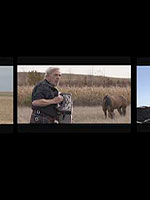 Prof Douglas Rosenberg
Prof Douglas Rosenberg
University of Wisconsin-Madison, USA
Douglas Rosenberg is an EMMY nominated director and the recipient of the Phelan Art Award in Video. He received the Director’s Prize at the International Jewish Video Festival for his film, “My Grandfather Dances” with choreographer Anna Halprin. He is is well-known for his collaborations with choreographers including Molissa Fenley, Sean Curran, Ellen Bromberg, Joe Goode, Li Chiao-Ping. Eiko and Koma and others.
Rosenberg was the director of the Video Archival Program at the American Dance Festival for a decade and is the founder and director of ADF’s Dancing For the Camera Festival. He has served on numerous panels and juries and organised a first Screendance Symposium in2000. His publications include Screendance: Inscribing The Ephemeral Image (Oxford University Press 2012), and The Oxford Handbook of Screendance Studies (Oxford University Press, 2016). He is Chair of the Art Department and Professor of Art at the University of Wisconsin Madison.
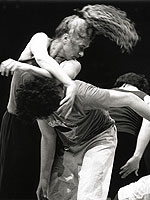 Prof Ann Cooper Albright
Prof Ann Cooper Albright
Oberlin College, Ohio, USA
A dancer and scholar, Ann Cooper Albright is Professor and Chair of Dance at Oberlin College and immediate past President of the Society of Dance History Scholars. She also serves on the executive board of the new Dance Studies Association and was recently awarded the Dixie Durr Award for Outstanding Service to Dance Research (2017). Combining her interests in movement and cultural theory, she is involved in teaching a variety of courses and workshops that seek to engage participants in both practices and theories of the body. She is the author of Engaging Bodies: the Politics and Poetics of Corporeality (2013), which won the Selma Jeanne Cohen Prize from the American Society for Aesthetics; Modern Gestures: Abraham Walkowitz Draws Isadora Duncan Dancing (2010); Traces of Light: Absence and Presence in the Work of Loie Fuller (2007); Choreographing Difference: the Body and Identity in Contemporary Dance (1997) and co-editor of Moving History/Dancing Cultures (2001) and Taken By Surprise: Improvisation in Dance and Mind (2003). The book, Encounters with Contact Improvisation (2010), is the product of one of her adventures in writing and dancing and dancing and writing with others. Ann is founder and director of Girls in Motion, an award-winning afterschool program in the Oberlin public schools and co-director of Accelerated Motion: Towards a New Dance Literacy. Her new book project, How to Land: finding ground in an unstable world, focuses on contemporary American embodiment post-9/11 and is due out from Oxford University Press in the fall 2018.
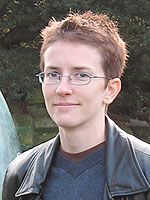 Dr Harmony Bench
Dr Harmony Bench
Ohio State University, USA
Harmony Bench is Associate Professor in the Department of Dance at The Ohio State University, where she is also affiliated faculty with Theatre, Folklore, Translational Data Analytics, and Women’s, Gender, and Sexuality Studies. Her research sits at the intersections of dance, media, and performance studies and revolves around encounters between bodies and machine or media technologies. Her writing has appeared in the Oxford Handbook of Dance and the Popular Screen, Choreographies of 21st Century War, and Dance on Its Own Terms as well as Theatre Journal, Dance Research Journal, The International Journal of Performance Arts and Digital Media, Participations, and Performance Matters, among others. Current projects include an open-access book in contract with University of Minnesota Press, Dance as Common: Movement as Belonging in Digital Cultures, as well as two digital humanities projects: Mapping Touring, which focuses on the performance engagements of early 20th century dance companies, and Dance in Transit, a collaboration with Kate Elswit that considers transportation infrastructure and support networks in Katherine Dunham’s dance touring of the 1950s. Both of these digital works in progress can be found at http://movementonthemove.osu.edu/. Since 2014, she has been co-editor of The International Journal of Screendance with Simon Ellis.
Dr Marisa Zanotti
Reader, University of Chichester
Marisa Zanotti began her career in dance, training at the Laban Centre and working extensively as a dancer and choreographer. Since receiving a Creative Scotland Award in 2000, Marisa’s professional practice has been in screenwork installation, dance film and most recently film drama. She has directed three short dramas and produced and directed four dance films and a video installation; her current interest in dance for the screen lies in the area of experimental and lo-fi work. She is developing a new screen drama project with writer Nichola McCartney and also works as part of a writer/director team with David Greig. Their first short film,“At the end of the sentence” received BAFTA and BIFA nominations and won the UK Film Council Audience Award and Best Short at The Hamptons Film Festival. She is a trustee of South East Dance and a Movement 12 artist. Her doctoral research entails examining the critical implications of her practice.
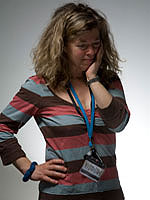 Prof Sarah Whatley
Prof Sarah Whatley
Coventry University, UK
Sarah Whatley was Co-Investigator for the Screendance Network. She has worked at Coventry University for more than two decades, introducing the first BA degree course in Dance in 1997. She is now Director of the Centre for Dance Research, which is home to 16 full-time research staff and more than 25 PhD students. Her research explores the interface between dance and a range of digital technologies, inclusive dance, intangible cultural heritage and somatic dance practices and pedagogy. Her research is funded by the European Union, the Arts and Humanities Research Council and various Trusts. She is a Strategic Reviewer for the AHRC as a member of the peer review college, and is an evaluator for the European Commission. She is founding editor of the International Journal of Dance and Somatic Practices, published by Intellect and sits on the editorial board of a number of other Journals.
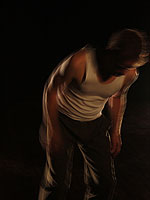 Dr Simon Ellis
Dr Simon Ellis
Senior Research Fellow, Coventry University, independent choreographer and dancer
Simon Ellis is a dance artist originally from New Zealand but now living in London. His recent choreographies are 'Pause. Listen' (2014), 'We Record Ourselves' (2016), and 'We Like Lists Because We Don't Want to Die' (2017). He also works closely with Colin Poole as 'Colin, Simon and I', and their latest work is 'Our White Friend' (2016). He is interested in the value and limits of practice-as-research for artists working in and outside of the academy, and in the limits and possibilities of collaboration in choreographic processes. Simon co-edits The International Journal of Screendance with Harmony Bench.
Dr Kyra Norman
Falmouth University, UK
Kyra Norman is a choreographer and researcher working in dance, theatre and film since 1998. She approaches her work with an expansive sense of choreographic possibility, and a commitment to bringing dance into conversation with the world around us. Alongside her work as a lecturer in Dance & Choreography at Falmouth University, Kyra has an ongoing artistic practice, working as a performer, choreographer and writer, and as a project manager for interdisciplinary arts events. Kyra holds a BA (Hons) in Dance Theatre (Laban, London) and an MA in Visual Performance: Time-Based Media (Dartington College of Arts, Devon). In 2015 she completed her PhD, investigating the screen as site for choreographic practice, at the University of Bristol's Department of Drama: Theatre, Film, Television. Current research interests include: site-specific performance making; dance on screen – particularly in relation to questions of site, place and location; improvisation in performance; interdisciplinary collaboration; situated writing – working from the body to the page.
kyra.norman@falmouth.ac.uk
Katrina McPherson
Independent Filmmaker
Award-winning artist Katrina McPherson has wide experience as a dancer and choreographer, as a director of television arts programmes for the BBC, ITV and Channel 4, and as a screendance artist.
Katrina has collaborated with many different dance artists and companies, both in Scotland and abroad. Katrina has also made documentary films with choreographer/teacher Royston Maldoom, with Adugna Dance Theatre in Addis Ababa and in Holloway Women’s Prison. She has directed promotional and documentation films for Scottish Dance Theatre. Most recently, Katrina has been working with improvising dance artist Kirstie Simson on a new film called ‘Force of Nature’ and has started a new collaboration with Tibetan dancer/choreographer Sang Jijia.
Katrina is a much sought-after teacher and mentor and has led master-classes and workshops in Scotland, England, Germany and Australia. Katrina is the author of Making Video Dance - a step by step guide to creating dance for the screen (Routledge 2006).
Dr Chirstinn Whyte
Freelance writer
Dr Chirstinn Whyte worked throughout Britain as a performer, teacher and choreographer for twenty years and completed a PhD at Middlesex University, London in 2008, researching choreographic practice for screen. Co-Director of Shiftwork, a Cambridge-based dance and new media partnership with work shown at screendance, short film and artists film events worldwide. Writing on screenbased work has featured in publications including Sydney-based RealTime and Dance Theatre Journal.
